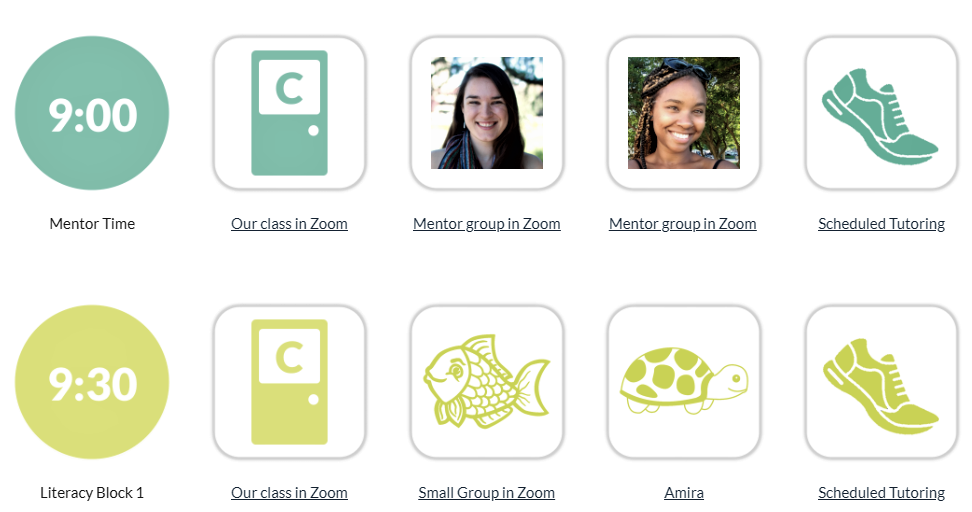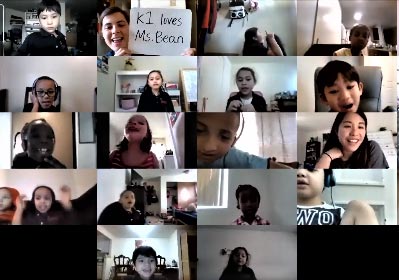Never Underestimate a Kindergartener: How a WA State Charter Organization Built a Synchronous Remote Learning Model

Responding to the Coronavirus Crisis
Impact Public Schools | Puget Sound Elementary is a charter school serving 260 scholars. Eighty-two percent of scholars are young people of color, 65.4% qualify for free or reduced price meals, and 30% are English Learners. When coronavirus hit Washington state, we launched a full distance learning program based heavily on our brick and mortar model. Blending synchronous and asynchronous instruction, K-2 scholars engage in social emotional learning (SEL) routines, math and literacy practice, decolonized project based learning, and robust enrichment programs. Through community-based strategic planning and rapid design and iteration, we implemented a student- and family-centered approach to school during COVID-19.
Impact at Home did not happen overnight and we had to flex into our core value of intention in designing our launch. After school buildings were closed on March 16th, the team took a number of steps to provide immediate services while developing a broader strategy:
- Within 24 hours of the governor’s announcement, we launched a GoFundMe campaign and raised enough money to provide every scholar with a laptop and immediately distributed devices. Additionally, operations staff planned for continued meal service and supported families in finding emergency childcare.
- Teachers were quickly trained to have multiple weekly touch points with their scholars, checking in on their well-being and coaching them through adaptive learning programs and differentiated work packets. All communication was diligently tracked in a master dashboard.
- We flooded social media and our parent messaging app with videos of read alouds and suggested at-home activities.
- When designing Impact at Home, we collected family feedback through community forums, checked in with every family on their availability to attend, and created alternative learning plans for scholars who needed a more flexible schedule.
- Teachers attended over six hours of PD to prepare for leading instruction in the digital space, and this PD has continued each week on Fridays.
- Instructional coaching tools were adapted to meet the needs of distance learning.
We are sharing our learning with educators and partners who are mission-aligned, preparing for multiple scenarios next fall, and working to open up Impact at Home for more students across Washington state and more educators across the country.
Brave Solidarity
COVID-19 has the potential to widen the opportunity gap. This can only be disrupted with bold plans. Leading with our value of brave solidarity, our team built a comprehensive distance learning program and leaned on the following principles:
- Integrate key components of Impact’s model: SEL, individualized instruction, PBL, and a culture of joy.
- Blend whole class, small group, and 1:1 instruction.
- Ease the burden on families by making the experience teacher- and student-led (instead of parent led).
- Create structure, and opportunities for flexibility if a family needs a different path.

When designing Impact at Home, we held meetings specifically with faculty who have children to ensure their teaching schedule was sustainable. We offered faculty with elementary age children to have their child in their distance learning class.
And, we certainly had wonderings about young scholars navigating tech platforms at home. But we then remembered that a Kindergartener sent us a video of herself demanding that we print her Lexia certificate. Needless to say, our kids can handle online learning.
To ensure that scholars and families could easily access all of Impact at Home, operation leaders quickly developed a landing page. By just opening this tab, scholars can see their daily schedule, with links to each component.
Key elements of Impact at Home
MENTOR TIME
Scholars start each day in Mentor Time, where the whole class engages in goal setting and a SEL routine grounded in Impact’s circle ritual. Every scholar shares how they are feeling and classmates come off of mute to offer one another resonance. Maintaining a focus on SEL is vital as scholars face uncertainty and social isolation.

LITERACY BLOCK
We are committed to ensuring every scholar reads on grade level and we refuse to let COVID interfere with scholar reading growth. During literacy block, scholars rotate between adaptive platforms like Lexia and Amira, and small group instruction. In small groups, teachers guide scholars through exercises that closely mirror in-person instruction. And, teachers up the joy by regularly infusing chants (“Are you ready are you ready? We’re always ready!), excessively narrating, and celebrating with Class Dojo points.
What does this look like in practice? Kennedy taps her palm on her forehead as Ms. Wall excitedly narrates, “Kiss Your Brain” during Kindergarten literacy block. Seconds later, Tsadik gets ready and the class comes off of mute to chant “Fingers out, sound it out.” Smile on his face, he eagerly anticipates whatever word Ms. Wall is about to present as his special challenge. This all happens over Zoom, where scholars rotate in and out of small group reading practice every morning.
MATH
Math routines in many ways mimic literacy block. Scholars access adaptive programs like Dreambox and teachers use daily data to pull groups for individualized instruction. Again, this part of the day emphasizes blending tech programs with joyous teacher-led groups.
ENRICHMENT
We expanded enrichment offerings through finding excellent online platforms made available to every child. Examples include ChessKid, DuoLingo, Code.org, and Cosmic Kid Yoga. Scholars have total choice during enrichment and don’t have to commit to just one option – they can explore any subject they choose on any given day.
PROJECT BASED LEARNING
All families received project kits in the mail and scholars work on projects using tangible materials – this is time away from the computer. Teachers regularly check in with scholars to monitor project progress and offer support. Impact values decolonized project based learning, which emphasizes the study of culturally relevant content culminating in a project connected to the community. It is essential to honor this part of the model even in the distance learning space. Scholars are currently researching careers in the community, analyzing how “community helpers” support us during both normal and challenging times. The project is multidisciplinary, and blends research, journal writing, crafting letters of gratitude, and designing artwork based on the #aworldofhearts movement.
Everyone Grows
We believe that every member of the Impact community is always growing. COVID-19 has presented an opportunity for us to push our practice. Our response to school building closures has prompted reflection, and below are some of our key learnings:
LESSON ONE | NEVER UNDERESTIMATE A KINDERGARTENER
Our Kindergarten scholars can navigate Zoom, multiple tech platforms, and stay on schedule in a virtual environment. We’re amazed at our scholars’ brilliance and they have raised the bar, attending and persevering in the virtual space every day. And, our teachers have done a wonderful job equipping our young scholars with these skills. Prior to launching this phase of distance learning, we held a virtual “Open House” to train families and scholars on key tech skills. During the first week of distance learning, teachers focused on precisely modeling and narrating computer use (navigating tabs, scrolling a page to find information, coming off mute in a zoom room) which undoubtedly helped scholars learn to navigate the virtual setting.
LESSON TWO | THERE IS ALWAYS A SILVER LINING
We will emerge from this stronger. When returning to brick and mortar, we will rely more heavily on the blended components of our model to create additional space for targeted, small group instruction between teachers and scholars. We will use Impact at Home as a summer school model to avoid summer slide.
LESSON THREE | MAINTAIN RELENTLESS COMMITMENT TO MISSION DESPITE OBSTACLES
We’re devoted to closing the opportunity gap and doing everything that we can to serve our scholars. Remaining committed to our mission allowed us to focus when COVID closures hit. We knew we needed to continue providing our scholars with the best services possible to prevent the widening of the opportunity gap. We went back to our model, highlighted the most essential parts, and built a school around those components.
COVID has brought unpredictable challenges and the future remains highly uncertain. School building closures have already begun to exacerbate the tremendous inequities that have long plagued American education. And, this absolutely does not have to be the case. The impact of COVID on student achievement is not predetermined. All public schools, district and charter alike, must confront the times with head on, bold ambitions. School systems, community organizations, and industry leaders can work together to increase access to technology in all homes, an effort that will have lasting positive impacts. We can use distance as an opportunity to perfect blended learning, to refine our approach to small group instruction. Let’s tackle the challenges of COVID directly and use this as a catalyst to make school better. We must not ride this out – we must act.
Alex Horowitz is the Regional Director of Schools for Impact Public Schools. Alex is a former teacher and school leader who now coaches principals.and oversees Impact’s talent work and leader pipeline.
Transcend supports communities to create and spread extraordinary, equitable learning environments.

